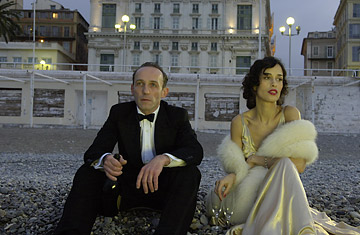
Not entirely about the Benjamins: The Counterfeiters is also about being unwilling participants in evil machinations.
In some ways it was a fairly typical Nazi wartime plan — bold in concept, yet slyly sadistic in its execution. For to execute it, they recruited from their concentration camps (which we must remember contained many ordinary criminals among populations) their most skilled forgers — engravers, printers, experts in ink and paper — and set them to work in the Sachsenhausen camp.
This is where the German's cruelty comes in: The counterfeiters were given unheard of privileges — decent food, clean quarters and beds, even a ping pong table, which, inevitably, the rest of the camp knew about and which, naturally, covered them with guilt verging on shame.
This is, in essence, a true story and it is one that writer-director Stefan Ruzowitzky tells with cool wit and subtle tension in The Counterfeiters, which is nominated for best foreign film at this Sunday's Oscars.
His central character, is called by the fictional name of Salomon Sorowitsch (Karl Markovic) but he is based on a real figure, who had been arrested before the war as Germany's most adept counterfeiter and recruited to his wartime duties by the cop who first arrested him in 1936. He's a rather chilly character; entirely amoral, he believes in only one thing—his own survival.
Markovic, a man with a hard face and a contemptuous manner, never suggests, at any point in the movie, that Salomon converts to a more humane way of thinking. But he takes under his wing a young printer whose wife has died in another camp and who is himself grievously ill. He is strangely tender with this character, even finding a way to provide him with the drugs he requires to make a fight for survival.
More interesting is the contest for what amounts to the soul of this den of thieves. There is a communist among them, a man intent upon sabotaging their efforts. He's a man full of noble speeches and ready to sacrifice all of their lives in order to foil the Nazi's plan, not because he disapproves of it, but because it is an act of resistance.
The contest between the idealist and the survival artist seems to me the heart of this movie. The former is willing, even eager, to sacrifice all of his fellow prisoners (or should we call them his colleagues?) for his principles. The latter insists that a man's first duty is to live, which is the natural precondition for—perhaps—doing something useful later, should the opportunity arise. I'm with Salomon. When you're dead, you're dead. Which is to say inutile, incapable of principled gestures, which may or may not make the world a better place, however pleasing they may be to your own ego. Which says nothing about mega-history, the movement of which as the war develops, will determine the fate of these men and the grand, mad scheme they're obliged to serve.
I can't, of course, tell you how that works out. I can perhaps hint that there are some wonderful ironies in the last reel. I can certainly say that if this movie cannot match the high moral sentiments of, say, Schindler's List , it is, on its much smaller scale, a very good movie, which like Spielberg's masterpiece, offers us a shifty central figure, whose much less certain redemption is fascinating to observe. The Counterfeiters leaves us pondering this question: When government itself becomes fully criminalized, does our hope of surviving its depredations depend not on brave acts of resistance, but on scuttling through the shadows, answering its monstrousness with our own determination merely to somehow live? Much of concentration camp literature seems to argue that. And so does this very fine and curiously moving film.
